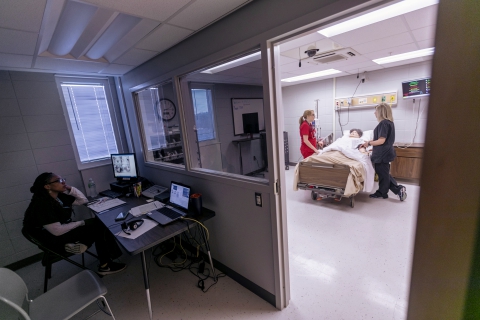
Story: Phillip Tutor | Photo: Betsy Compton
Blue Cross Blue Shield of Alabama’s charitable arm sees value in funding scholarship
Nursing students at the University of West Alabama benefit from the experience of the Ira D. Pruitt Division of Nursing faculty and a rigorous curriculum that prepares graduates for licensure examinations and employment. The financial assistance available to eligible students comes from different sources and in varied forms.
A notable example is The Caring Foundation, the corporate charitable foundation of Blue Cross and Blue Shield of Alabama that has contributed to UWA for nursing scholarships for the last five years. Initial awards went to students seeking associate’s degrees in nursing and now are issued to students pursuing bachelor’s degrees in nursing.
“The Caring Foundation Scholarship has eased the financial burden that our students face as they have to travel to clinical facilities, purchase uniforms and other nursing equipment,” said UWA’s Dr. Mary Hanks, chair of the Division of Nursing. “Nursing can be a costly major, and many of our students need financial assistance.”
Since its creation in 1990, the foundation has championed what manager Tim King describes as the philanthropic entity’s “three pillars” — the improvement of Alabamians’ health, wellness and education. UWA is one of several universities and other eligible organizations that has received scholarship funds from BC/BS of Alabama’s charitable arm.
Those three pillars don’t cover all of the foundation’s priorities, King said.
“Some things kind of bleed over into multiple categories, because we believe it’s hard to really be healthy and well if you don’t have a good education,” he said. “A lot of the focus we’ve had at UWA and other universities has been to help them fund nursing degrees in the state, because we do have the need for more nurses and primary care doctors in Alabama.”
Eligible universities and organizations apply for funding from The Caring Foundation, but King and his colleagues leave decisions regarding student selection to school faculty and administrators. At UWA, the Nursing Scholarship Committee reviews students’ financial needs and confers with the Office of Financial Aid before deciding which students receive scholarships and the value of each award, Hanks said.
UWA’s location within Alabama’s Black Belt and its regional role regarding education and economic development within one of the state’s impoverished areas corresponds with The Caring Foundation’s goals, King said. “We like working with the University of West Alabama. We like their mission.” Additionally, the cycle that links education to job creation to wellness in the Black Belt is paramount.
“We definitely want to add to that pipeline (of new nurses) and add more health-care providers,” he said. “It’s about giving young adults in our state opportunities to get those scholarships and have careers that are well paid. In turn, they’re probably the best candidates to serve in those same areas, but now they’ve got a degree and are able to earn a fantastic wage.”
The Caring Foundation’s support isn’t the only scholarship program for nursing students at UWA. Another is Project EARN, which funds scholarships for students from disadvantaged backgrounds and is a byproduct of a $2.4 million grant over a five-year period awarded in 2020 by the U.S. Department of Health and Human Services’ Health Resources and Services Administration.